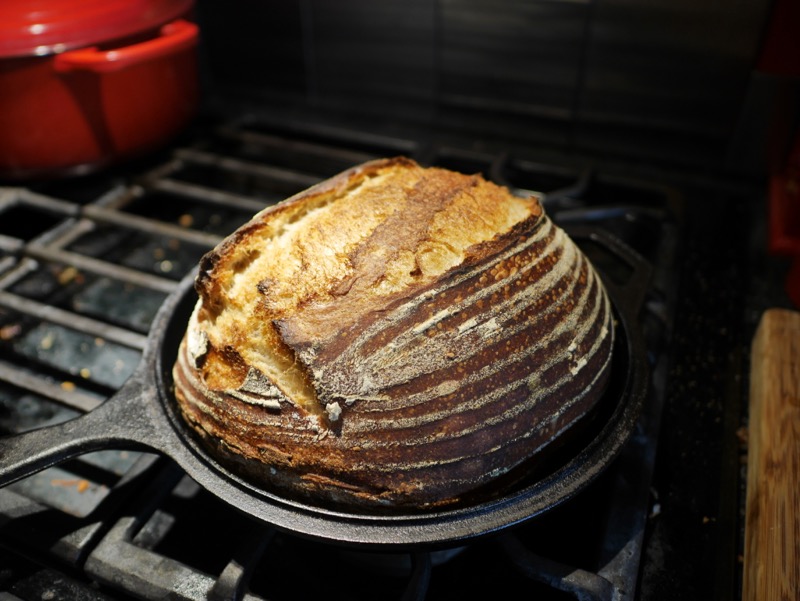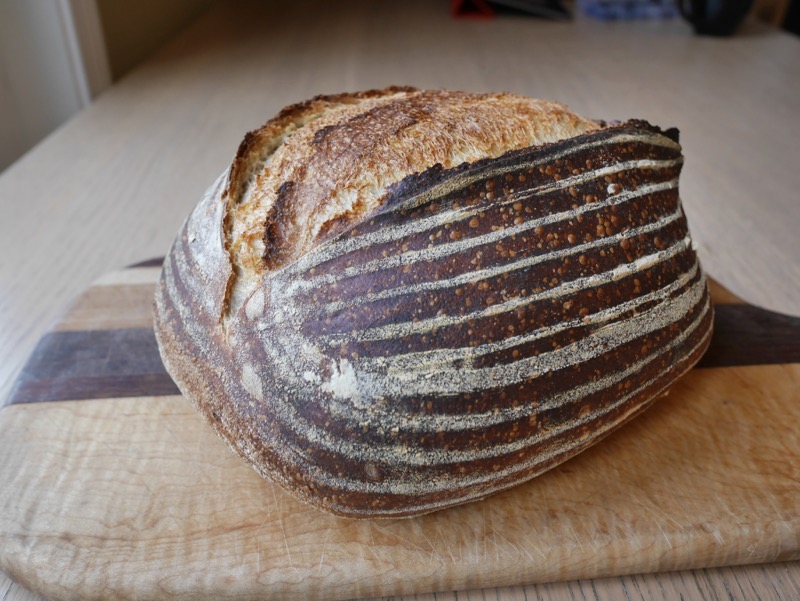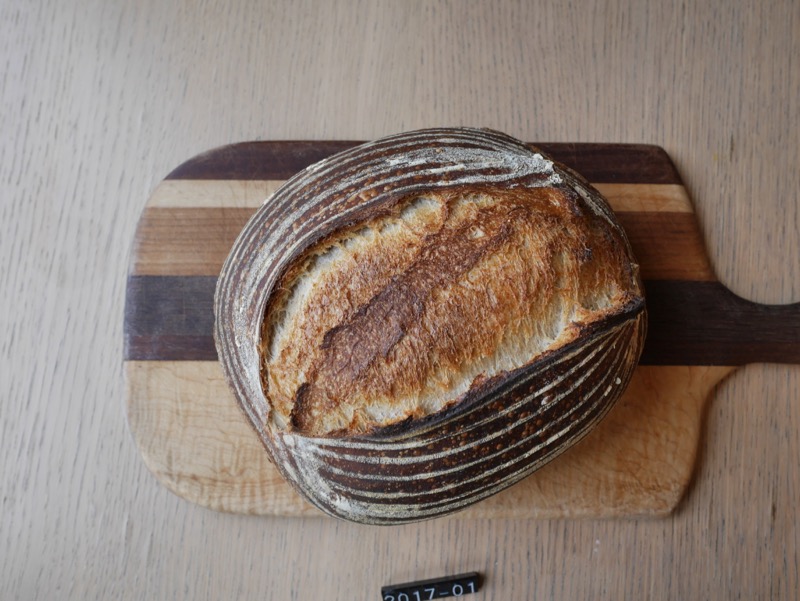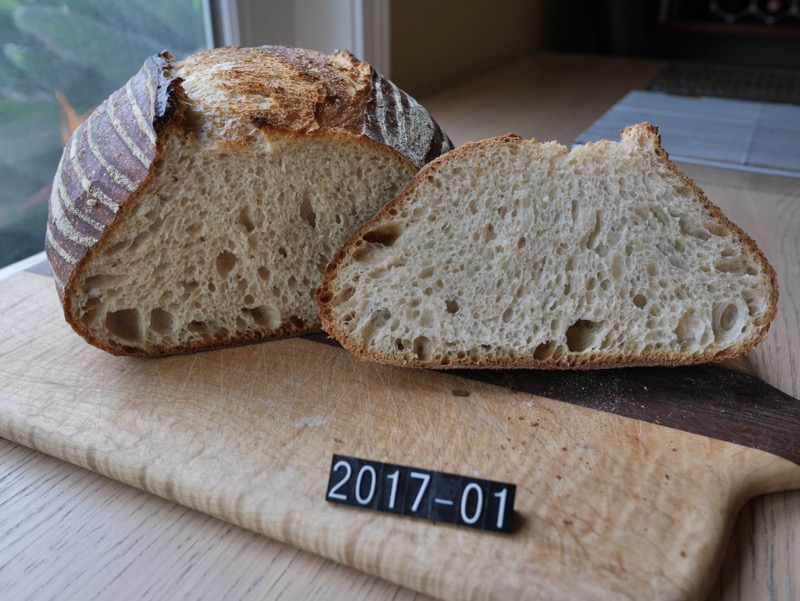
I'm starting off this challenge with a relatively simple loaf. This is my own version of the Tartine country loaf, simplified quite a bit from the original and timed to work in my kitchen with my starter. I skip the overnight levain altogether, and just use ripe starter. There's more acid transfer, but I actually like my sourdough sour. And I skipped the autolyse step as well. The regular turning at 30 minute intervals I retained, but then proof for an excessively long 10 hours overnight in a cool 65 degree kitchen. The result is much tastier than my attempts at making a strictly by-the-book Tartine loaf, but that probably has much to do with the very long ferment. I've never had the pleasure of tasting the genuine article from Tartine, so I'm assuming it's just my kitchen and my starter not cooperating with Chad's instructions.
My recipe is as follows:
- 450g KA bread flour
- 50g KA whole wheat flour
- 150g ripe starter
- 350g water (room temperature)
- 12g salt
As I said, proofing was overnight for about 10 hours at about 65 degrees for most of that time. Cooked for 20 minutes covered and 20 minutes uncovered.




(A note about the numbers in the photos: I'm keeping notes on each loaf I bake for my 2017 challenge, and the numbers help me connect the photos with the notes. The number set in these photos means it is the first loaf baked in 2017).
- Modern Jess's Blog
- Log in or register to post comments
Looks like you nailed loaf number for the year.
I'm really looking forward to seeing how you go with your challenge. I'll be cheering you on from my side of the world :)
Happy baking Jess
Ru
Thanks! I'm pretty pleased with it. This one will probably be repeated pretty often over the next year, as it is a crowd favorite.
Very lovely! Looks so good to eat and nourishing to those who will eat it! First loaf of the year is grand, can't wait for your next loaves! Good luck with your challenge!
Thanks very much, it will be an adventure.
Makes me want to give that one a shot, too, using my starter. I like my sourdough to be sour, as well. Congratulations, it sure is lovely!
I'm a big fan of the country loaf. Try it! For me, though, it really takes a long ferment to get it to taste good.
your loaf looks great! And I like the numbers too :)
Great looking loaf.
Let me understand your shaping process. After bulk fermentation is complete, you perform the final shaping and then let the dough ferment for another 5 to 10 hours in a cool room or in the fridge ... then right to the oven?
I'm not sure there is a "right" way to make bread, but your approach is a bit different than I've read or watched online ... my process is to mix the dough, bulk ferment at room temp for an hour or two, then into the fridge for something like 12 hours, then shape, final proof and bake. I don't get nearly the oven spring as I see in your pics or in other pics posted by other bakers on this site.
I think the next loaf I'll try your method.
Cheers-
Dave
I think the hardest thing about baking bread is making sense of all the various techniques, and figuring out which parts of each technique are integral and connected and which techniques are mutually exclusive (or just redundant) to each other. My technique is not hard, but arriving at this technique took me two years of experimenting with other people's techniques to find something that worked with my starter in my kitchen. Now, bread making is relatively simple for me, but it certainly wasn't always that way. And I don't think very much of it is actually skill -- most of it is just knowing what to do in what order.
I do a short bulk ferment (3 hours while doing regular Tartine-style turns at 30 minute intervals) and then (sometimes) a bench rest, and then I form the loaf. After that, it's all proofing, on the countertop in a cool kitchen (65° F, generally) and usually overnight. That's at *least* 7-8 hours of proofing, on top of the bulk ferment.
I've never had much success with my starter and in the temperature range that my kitchen exists in using other techniques. The strict by-the-book Tartine process, for instance, produces very bland loaves in my kitchen. I find that in order to get a tasty loaf, I have to do a long ferment. I do that during proofing (rather than bulk rise) because it means my formed loaf will rise and go into the oven with very, very little handling.
Even getting the loaf into the bottom of the lodge combo cooker, I take care to make sure the dough is disturbed as little as possible. I invert the (very hot) skillet, mate it to the top of the banneton, and flip them over together as one. Then I remove the banneton from the top of the skillet and place the other half of the combo cooker on top.
Good luck with it! And definitely keep experimenting to find what works well in your kitchen.
for sure! Well done and happy baking